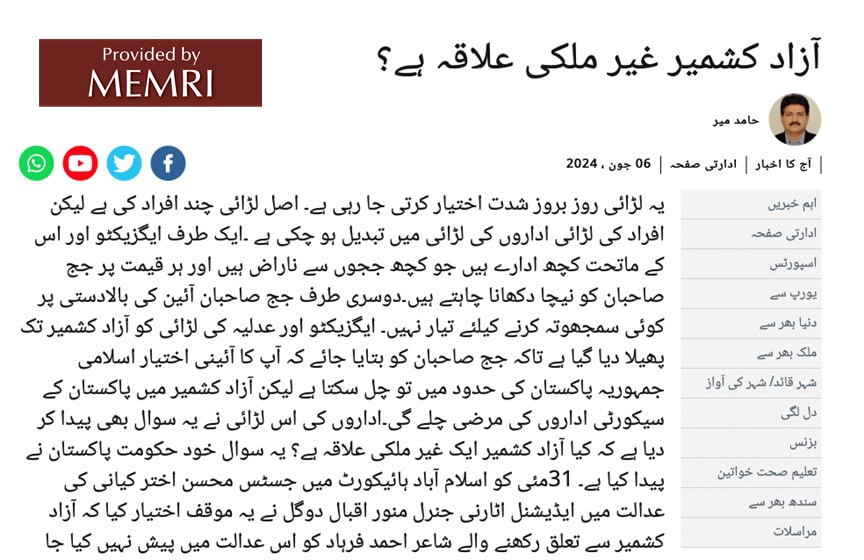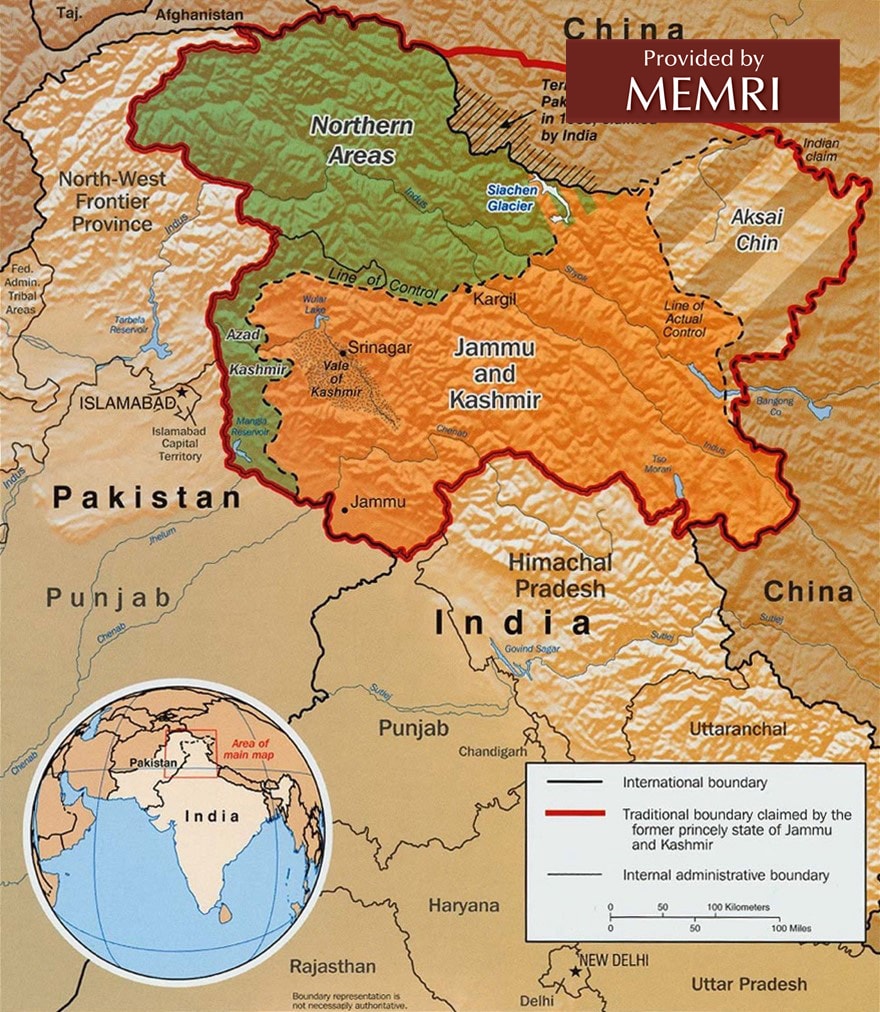The erstwhile state of Jammu and Kashmir, which included Gilgit Baltistan, is divided between India and Pakistan, with the Pakistani part known as Azad Jammu & Kashmir and the Indian part as Jammu & Kashmir. In addition to Azad Kashmir (short for Azad Jammu & Kashmir), Pakistan also occupies Gilgit Baltistan region.
Jihadi groups in Pakistan have previously noted that Pakistan does not share border with China because Gilgit Baltistan is not officially a part of Pakistan.
After the 1947 Partition of the Indian subcontinent, Pakistan sent irregular tribesmen and jihadi fighters to occupy Jammu & Kashmir, which, according to the partition plan, was an independent state. Unable to fight Pakistani troops, the Hindu ruler, Maharaja Hari Singh, acceded to India, enabling Indian troops to march into his princely state, but a portion remained under the control of Pakistani troops and is now known as Azad Kashmir.

The UN Security Council later passed resolutions requiring a plebiscite in Jammu & Kashmir under the following conditions: Pakistan will withdraw its troops first; subsequently India will reduce its military presence; and thirdly a plebiscite will follow in Jammu & Kashmir. Since Pakistan did not withdraw, the UN resolutions became redundant.
In his recent column, "Azad Kashmir Is A Foreign Territory?" in the mass-circulation Urdu newspaper Roznama Jang, Pakistan's celebrated journalist Hamid Mir took up the case of Ahmad Farhad, a Pakistani-Kashmiri journalist and poet who was picked up by the Pakistani military. However, when the matter came up before the Islamabad High Court, the Additional Attorney General of Pakistan told the court that Ahmad Farhad is in Azad Kashmir which, he said, is a foreign territory, and therefore not under the jurisdiction of the court.
Following are excerpts from Hamid Mir's column:[1]
"Additional Attorney General Munawwar Iqbal Duggal Said [Before The Islamabad High Court] That The Poet Ahmad Farhad, Who Hails From Azad Kashmir, Cannot Be Presented In This Court Because He Is Wanted In Several Cases By The Azad Kashmir Police"
"This fight is intensifying day by day. The real fight is of a few people, but the fight of people has turned into a fight of institutions. On the one hand, the executive and some of its subordinate institutions are angry with some of the judges and want to humiliate the judges at any cost.
"On the other hand, the judges are not ready to compromise on the supremacy of the Constitution. The fight between the Executive and the Judiciary has been extended to Azad Kashmir to tell the judges that your constitutional authority may operate within the boundaries of the Islamic Republic of Pakistan, but the will of Pakistan's security agencies will prevail in Azad Kashmir. This fight of institutions has also raised the question whether Azad Kashmir is a foreign territory. This question has been created by the government of Pakistan itself.
"On May 31, in the court of Justice Mohsin Akhtar Kayani at the Islamabad High Court, Additional Attorney General Munawwar Iqbal Duggal said that the poet Ahmad Farhad, who hails from Azad Kashmir, cannot be presented in this court because he is wanted in several cases by the Azad Kashmir police and is currently in physical remand after arrest.
"Then Mr. Duggal respectfully told the court, 'My Lord! Azad Kashmir is a foreign territory. It is not possible to present a detainee from there in this court.' On this constitutional matter, Justice Mohsin Akhtar Kayani showed patience because Ahmad Farhad disappeared not from Azad Kashmir, but from Islamabad on May 14.
"During the hearings of the case for the recovery of Ahmad Farhad from May 14-29, the Islamabad police even stated that they had traced Ahmad Farhad's location in Khyber Pakhtunkhwa through geo-fencing and that he would be presented in court very soon. However, on May 29, it was reported that he was arrested at Kohala while going to Bagh, and in the FIR registered on the same day, his only crime was reported as misconduct with the police.
"On May 31, the court was informed that Ahmad Farhad was also facing terrorism charges and that Azad Kashmir is a foreign territory. It was also stated to the court that Ahmad Farhad did in Azad Kashmir what the Tehreek-e-Insaf supporters did in Pakistan on May 9 last year [violent anti-military protests on May 9 of 2023]. This stance of the government of Pakistan sparked a debate in Pakistan's political and legal circles about whether Azad Kashmir is a foreign territory."
"According To The United Nations Resolutions, The Jammu And Kashmir Currently Under Indian Occupation Cannot Be Considered A Part Of India, And Azad Kashmir Cannot Be Considered A Part Of Pakistan"
"According to the United Nations resolutions, the Jammu and Kashmir currently under Indian occupation cannot be considered a part of India, and Azad Kashmir cannot be considered a part of Pakistan. India itself took the Kashmir issue to the United Nations [in 1948] and then began violating the United Nations Security Council resolutions on Kashmir [requiring a plebiscite after the withdrawal of Pakistani troops which did not pull back].
"The majority of Kashmiris desire freedom from India, but they are compelled to use Indian passports and Indian identity cards. People in Azad Kashmir also have to use Pakistani passports and identity cards. In Indian parliament, there is representation for occupied Jammu and Kashmir, but in the Pakistani parliament, there is no representation for Azad Kashmir.
"According to the Karachi Agreement of April 28, 1949, the Government of Azad Kashmir handed over its defense and foreign policy to the Government of Pakistan while retaining administrative control. However, all matters [including administration] related to Gilgit and Ladakh were given to the Government of Pakistan.
"Subsequently, Article 257 of the 1973 Constitution stated that when the people of the State of Jammu and Kashmir decide to accede to Pakistan, the relationship between Pakistan and the State will be determined in accordance with the wishes of the people of the State."
"Ironically, [Demanding The] Accession Of Azad Kashmir [Into Pakistan] Is The Official Policy Of The State Of Pakistan – Opponents Of Pakistan's Accession Or Supporters Of Independent Kashmir Are Not Allowed To Participate In State Elections" In Azad Kashmir
"In 1974, the elected assembly of Azad Kashmir adopted the Constitution of Azad Kashmir. Under this constitution, the High Court and Supreme Court of Azad Kashmir have issued many rulings indicating that Azad Kashmir cannot be called a colony or a province of Pakistan, but administratively, it is considered a part of Pakistan.
"Ironically, [demanding the] accession of Azad Kashmir [into Pakistan] is the official policy of the state of Pakistan. Opponents of Pakistan's accession or supporters of independent Kashmir are not allowed to participate in state elections [in Azad Kashmir], but the government of Pakistan declares Azad Kashmir a foreign territory in the Islamabad High Court.

"If Ahmad Farhad had given this statement that Azad Kashmir is a foreign territory, then he would have been declared an enemy of Pakistan, but if [the Additional Attorney General] Munawwar Iqbal Dugal gave this statement, it would not matter. When I criticized this statement of the Additional Attorney General of the Government of Pakistan, a person holding an important constitutional position of Pakistan called me and apologized to me for the statement declaring Azad Kashmir as a foreign territory.
"I asked [him] why you are apologizing to me, tell the court that this statement is wrong. He said he will talk to the Prime Minister [Shehbaz Sharif]. Those who understand the sensitivity of the Kashmir issue know that the statement of the Additional Attorney General is wrong not only politically but also legally. Syed Manzoor Hussain Gilani, the former Chief Justice of the Azad Kashmir High Court and the Azad Kashmir Supreme Court, gave several decisions in which it was said that Azad Kashmir is not a foreign territory."
"In The Conflict Between [The Military And Judiciary] Institutions, Who Is Strengthening The Hands Of The Enemies [i.e., India]?"
"A notable decision by the former Chief Justice Syed Manzoor Hussain Gilani in 1999 was in the case of the Ameen Spinning Mills Mirpur Vs. the National Bank of Pakistan. The Ameen Spinning Mills took the position that they would not pay duty at Karachi Port because the goods were being imported to Azad Kashmir, which they claimed to be a foreign territory. In his ruling, Justice Syed Manzoor Hussain Gilani wrote in his decision that Azad Kashmir and Pakistan do not fall under the definition of foreign territories for each other; rather, they are one country under two systems.
"He wrote that Azad Kashmir is not a constitutional province of Pakistan but holds a provincial status within Pakistan. Nationalist circles [those who reject the federal idea of Pakistan] criticized this decision heavily. However, in 2006, Justice Gilani authored another decision, stating that Azad Kashmir cannot be considered a province under Article 1 of Pakistan's Constitution but falls under the definition of a territory included in Pakistan as per sub-clause (d) of clause 2 of the same article.
"When all major political parties of Pakistan and all significant state institutions have branches in Azad Kashmir, how can it be considered a foreign territory? If it is indeed a foreign territory, then what is the Pakistani army doing there? Has the Pakistani army illegitimately occupied Azad Kashmir?
"In the conflict between [the military and judiciary] institutions, who is strengthening the hands of the enemies [i.e., India]? Ahmad Farhad will be released sooner or later, but Munawwar Iqbal Duggal's statement will always be used by Pakistan's opponents against Pakistan. Therefore, the government of Pakistan should promptly inform the Islamabad High Court in writing that the statement given by the Additional Attorney General on May 31, 2024, was based on a misunderstanding."
[1] Roznama Jang (Pakistan), June 6, 2024.




